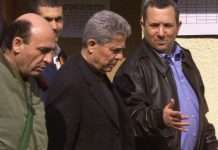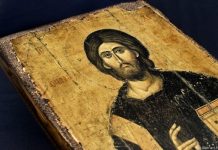Separate Assyrian Churches From State, Says Assyrian Confederation of Europe
Assyrian Confederation of Europe
Assyrian International News Agency/November 10/16
The Assyrian Confederation of Europe is concerned by the growing influence of churches in Assyrian politics in Iraq, which has been revealed in recent developments.
Recent meetings on the subject of the future of the Nineveh Plain conducted in Iraq between Assyrian political groups have been initiated and attended by church leaders. These meetings, and developments surrounding them, have made it clear that the Christian leadership in Iraq is seeking to facilitate the entry of the Peshmerga into the Nineveh Plain.
We are alarmed by reports that church leaders are advancing the interests of Kurdish nationalists whose clearly stated aim is the conquest of the Nineveh plain. We echo the findings of Human Rights Watch in the report “On Vulnerable Ground”, which reveals how the KRG utilizes church leaders to undermine the rights of the Assyrian nation. The HRW report states:
“Kurdish authorities have tried to win favor with the minority communities by spending millions of Iraqi dinars to build a pro-Kurdish system of patronage in minority communities, financing alternative civil society organizations to compete with, undermine, and challenge the authority of established groups, many of which oppose Kurdish rule. The KRG also funds private militias created ostensibly to protect minority communities from outside violence, but which in reality serve to entrench Kurdish influence. Finally, the Kurdish leadership has enriched the coffers of some minority religious leaders, and paid for expensive new places of worship in order to win over minority religious establishments.”
What is most troubling about the fervor with which church figures are now seeking to formalize the Kurdish nationalist annexation of the Nineveh plain is that it comes over two years after the Peshmerga not only failed to protect Assyrian villages and towns in the Plain, but betrayed the Assyrian people to genocide at the hands of the Islamic State. The unnatural eagerness which drives these clergymen to endorse the invasion and occupation of their own land by these same Peshmerga forces (and the Assyrian sub-militias under their command which serve to burnish their image) reveals either that they are not free to advocate for positions that will allow their own people to survive and flourish, or that they have decided of their own volition to actively endorse the oppression of Assyrians. Both possibilities demonstrate the total lack of legitimacy and suitability of church figures as representatives of Assyrians on the levels of politics and security, re-affirming the need to distinguish between church matters and national questions. Patriarch Gewargis III of the Assyrian church of the east, patriarch Louis Raphael Sako of the Chaldean church, patriarch Aphrem Karim II of the Syriac Orthodox church and patriarch Ignatius Joseph III Yonan of the Syriac Catholic church must cease to interfere in political affairs of the nation.
“The Assyrian churches are doing a great job in supporting displaced Assyrians in Iraq, however we cannot accept clergy to engage in political affairs or claim to represent our nation politically”, says Attiya Gamri, President of the Assyrian Confederation of Europe, concluding that: “State and church must be separated within the Assyrian nation”.
The Nineveh Plain Protection Units (NPU) is the legitimate military expression of the Assyrian people in Iraq. It is supported by the central government of Iraq and fights under the international auspices of the Nineveh Liberation Operation. While the clergy advocates for policies that will subvert and endanger the extraordinary efforts of the NPU to liberate and secure their homeland from the scourge of the Islamic State, many fighters drawn from the very congregations of these clergymen are planting both the flag of Iraq and their own Assyrian nation simultaneously in the soil of their forefathers, pointing to a future where Assyrians can at last live without exploitation in the land they have inhabited for thousands of years.
The churches of the Assyrian people have been historically, and are presently, attached to their own institutional enrichment rather than the need to assert the ethno-political rights of the Assyrian community. To assist the evolution of Iraq into a democratic and pluralistic state, it is essential that the secular political representation of its ethnic communities be granted legitimacy over religious and sectarian interests.
The Assyrian Confederation of Europe, which is made up of national federations supported by tens of thousands of Assyrians from the different Assyrian churches, calls upon the international community:
To disregard political statements made by religious figures claiming to speak on behalf of the Assyrian people;
To maintain and expand support for the Nineveh Plain Protection Units with arms, training and other resources.





















